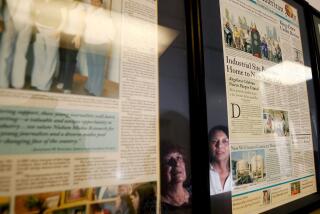Publisher Challenges Union Power in London
- Share via
LONDON — A publishing entrepreneur has announced plans to launch a new national newspaper that could revolutionize Britain’s print industry and break the awesome power of its unions.
In a one-man challenge to London’s Fleet Street, home of national newspapers and antiquated printing, Eddie Shah has raised $22 million to publish the newspaper seven days a week with an initial print capacity of more than 1 million copies.
Shah will print outside London, hire non-union labor and use the latest computer technology --commonplace in other industrialized countries but successfully blocked by the printers unions of Fleet Street for 20 years.
“We’re going after an industry just ripe to be taken; it just needs one guy,” Shah told reporters, announcing that his yet-to-be-named newspaper will start printing next spring.
“And after me there will be more and more people doing their own thing. That’s when Fleet Street will really start to feel the pinch.”
One of Shah’s sources of funds is a state-run bank in communist Hungary, which is putting up nearly $10 million for eight presses. Sogat ‘82, the largest print union, has sent a protest to the bank.
Shah said British banks turned him down. “They were frightened of the unions and they gave in to intimidation.”
Both managements and unions have reason to be disturbed at the offensive by the 41-year-old Shah, son of an Iranian diplomat father and an English mother. He began life as Salem Shah and got the nickname Eddie as a schoolboy at Gordonstoun, a private school in Scotland where Prince Charles was educated.
A publisher of give-away newspapers in northern England, Shah won a landmark victory in 1983 over a powerful print union, the 129,000-member National Graphical Assn.
He fired six of the union’s printers, rejected a union closed shop at his Messenger Group plant at Warrington, Cheshire; defied thousands of pickets, and won a lawsuit that culminated with a fine of $1 million on the union.
Now Fleet Street publishers fear for their circulations and advertising with a competitor not hobbled by the strong unions, wildcat walkouts and restrictive practices that characterize national and, to a lesser extent, regional newspapers.
But, commented the independent Financial Times, if Shah’s new newspaper makes it, “he will have done the Fleet Street proprietors a big favor” by humbling the unions.
John Le Page, director of the Newspaper Publishers Assn., believes Shah’s newspaper will succeed and in the process cut into circulation figures of other papers.
“But if he succeeds, it is also more than conceivable that other proprietors will be looking around at the scene to see where they can print (outside London),” said Le Page. His association represents owners of 17 major national newspapers.
Apart from a few profitable exceptions, such as Australian publisher Rupert Murdoch’s 4 million circulation Sun and its Sunday tabloid companion, the News of the World, most Fleet Street newspapers lose money or just break even.
On daily sales of nearly 15 million copies and 18 million on Sundays, Fleet Street’s combined net profit last year was $26 million, a return on capital of 1.7%.
“I’m taking advantage of the technology available,” Shah said, “and breaking down the old barriers of high costs, capital and labor.”
Cutting Down Economically
As Shah plans his launch, some long-established newspapers are trying to take steps to put their houses in order economically.
The 130-year-old Daily Telegraph, the only Fleet Street newspaper owned by a family as opposed to a corporation, is seeking $135 million to finance new printing works.
The Telegraph--whose 1.2 million circulation nearly equals the combined sales of the three other “quality” dailies, the Times, Guardian and Financial Times--is expected to lose $1.1 million this year.
Shah said he needs just 500 staffers for his new newspaper, which will have color and be centrist politically.
Unlike Fleet Street journalists, Shah’s 160 reporters and editors would write and edit stories on computer terminals linked to the printing presses.
His total payroll of 500 is a sharp contrast to the 6,000 staffers it takes to produce the Express group’s 2 million circulation Daily Express, 2.5 million circulation Sunday Express and 1.5 million circulation Daily Star.
After hearing Shah’s plans, publisher Robert Maxwell told unions at his Mirror Newspaper Group that unless they agree to big manning reductions he will shut down. He set no deadline.
More to Read
Sign up for Essential California
The most important California stories and recommendations in your inbox every morning.
You may occasionally receive promotional content from the Los Angeles Times.













